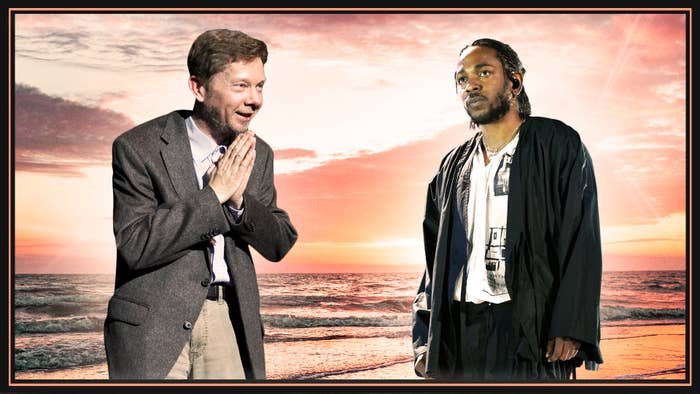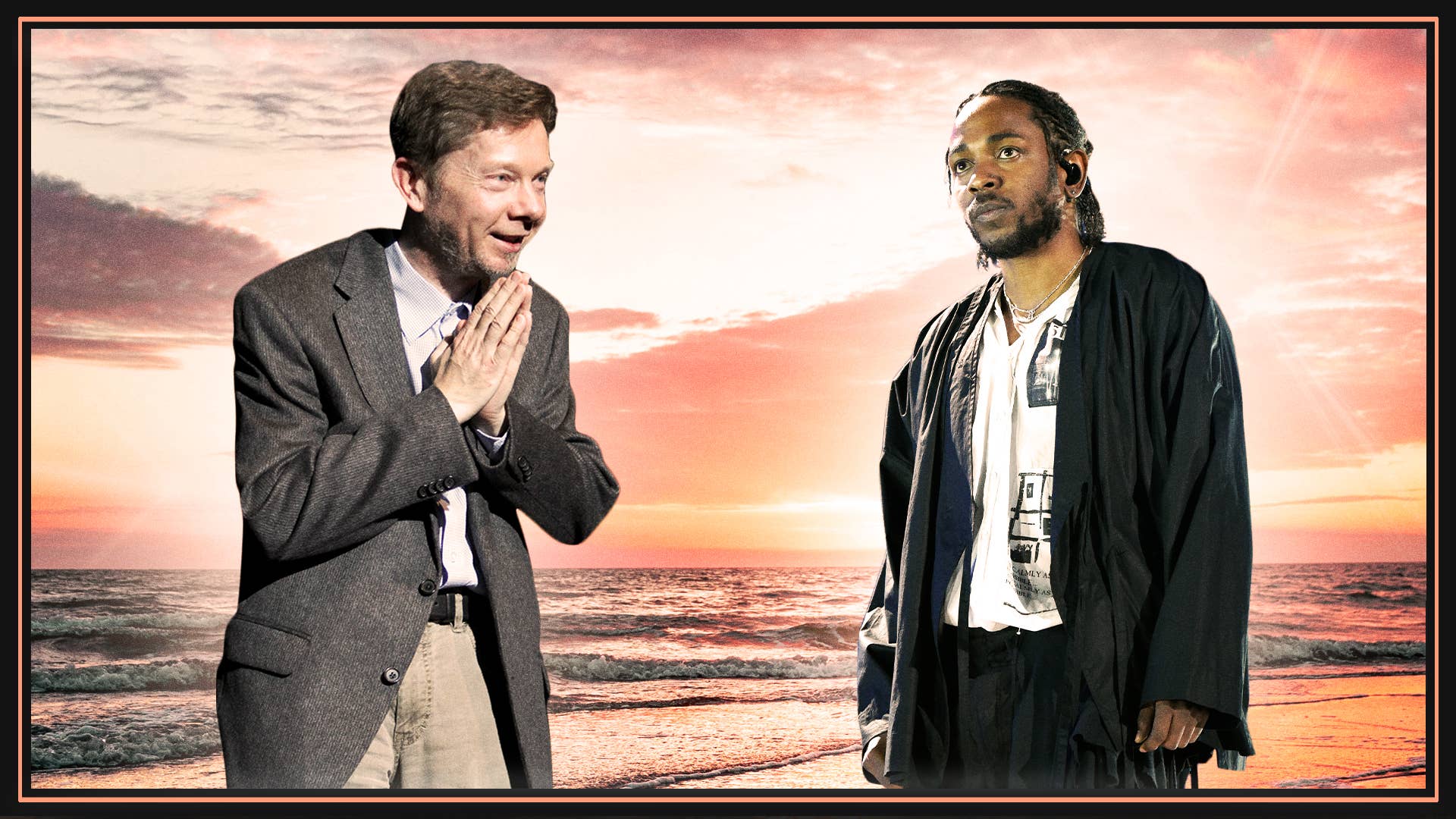
During the five-year wait for Kendrick Lamar’s new album, there was a lot of speculation about who he might collaborate with. Would he finally reunite with J. Cole or Drake? Maybe he’d spar with a newer star like Lil Baby?
Not quite. The two people who appear on Mr. Morale & The Big Steppers the most (besides Kendrick himself) are Kodak Black and Eckhart Tolle.
Kodak’s controversial appearance on three songs has been widely discussed since the album dropped, but the story behind Tolle’s involvement has remained a mystery. Until now.
Eckhart Tolle is a spiritual teacher and author from Germany who is most well-known for The Power of Now, a book that encourages readers to live in the present moment and avoid getting caught up in anxiety about the past and future (among other teachings). On Mr. Morale, he shares nuggets of wisdom throughout the tracklist, guiding listeners through the album’s biggest themes.
So how did a German spiritual teacher end up on one of the most anticipated rap albums of the decade? Well, it turns out the unlikely collaboration has been years in the making.
When Tolle published The Power of Now in the late ’90s, it became a New York Times bestseller, and he was called “the most popular spiritual author in the United States” by the paper. Since then, his words have reached millions of people—including Kendrick Lamar.
While Kendrick was working on Mr. Morale, he had the idea to incorporate Tolle’s teachings on the album, so he reached out and asked. Tolle admits he’s “not in touch with popular culture very much” and was only familiar with Kendrick by name when he got the call, but after doing some research, he became interested in the opportunity. “I’m always interested in the teaching reaching people that it otherwise might not have reached, especially in the mainstream,” he says.
Before agreeing to participate, though, Tolle wanted to meet with Kendrick face to face, so the two arranged to sit down together in a Los Angeles hotel room.
“I was very favorably impressed by him,” Tolle recalls. “We got on very well. I found him soft-spoken, quite present, and more introverted than extroverted. We had a talk, and while we were talking, I couldn’t detect any ego in him. He was very present, so I had a good feeling about him.”
A few months later, Tolle went to a studio and recorded his voice for the album. This all happened before the COVID-19 pandemic, and there was a long wait until the album actually came out, but Kendrick started leaving hints about Tolle’s involvement shortly after they met. In a visual mission statement for Kendrick’s pgLang company, posted to YouTube on March 9, 2020, there’s a short clip of Tolle’s sit-down meeting with Kendrick. In the background, a pitched-down version of Tolle’s voice says, “When you’re identified with something that you are not, it always leads to suffering and unhappiness.” Outside of a lone reddit post, the clue went largely unnoticed.
Two and a half years later, Mr. Morale finally came out, and the surprise was revealed: Tolle’s voice is used as the glue that holds the album’s narrative together.
On “Father Time,” Kendrick is urged to go to therapy by his fianceé Whitney Alford, who tells him, “You need to talk to somebody. Reach out to Eckhart.” From there, Tolle’s voice is heard frequently, as Kendrick grapples with trauma that has negatively affected his life. On “Savior (Interlude),” Tolle warns against forming a sense of identity from being a victim. Then he gives an example of someone developing a sense of self based on things that were done to them as a child, laying the groundwork for Kendrick’s own reflections on childhood abuse.
“The key to spiritual awakening is to become aware of the present moment. It means you step out of your stream of thinking. Your attention moves into the present, rather than being in the stream of thinking.”
Later, the climax of the album is introduced by words from Tolle about one of his most famous concepts: the pain-body. At the end of “Mr. Morale,” right before Kendrick has a breakthrough on “Mother I Sober,” Tolle says, “People get taken over by this pain-body because this energy field almost has a life of its own. It needs to periodically feed on more unhappiness.”
In the fast-paced context of the album, the meaning behind the “pain-body” may have gone over some people’s heads, so I asked him about it.
“To summarize, everybody carries a certain amount of emotional pain in their energy field, and it often originates in childhood,” Tolle tells me. “The emotional suffering leaves residues in the energy field. It doesn’t just disappear. The residues gradually build up, and by the time a person reaches adulthood, he or she carries an emotional energy field inside that can be described as pain that you carry from the past. This bundle of emotional pain that lives in you, I call the pain-body.”
As Tolle explains it, the pain-body “has a life of its own” and its intensity builds up over time. “In most people, the pain-body is not always active, and they don’t even know it’s there,” he says. “Then, periodically, the pain-body awakens from its dormant state and needs them to experience additional pain in order to stay alive. It needs to feed on additional pain, so it actually creates emotional pain. This is an unconscious process for most. They’re so identified with the emotion that they have no space of awareness from which they can witness the emotion. Suddenly, the person feels they’re in the grip of a very negative emotion.”
Tolle says the pain-body often causes problems in romantic relationships. “This negative emotion then seeks to feed on somebody close to you,” he notes. “Often, it’s your partner. It seeks to provoke a negative reaction in the partner because it wants the drama. It needs the drama. One could say it’s an addiction to pain. It wants a negative reaction, so it pushes just the right buttons in your partner, and you get into a very violent argument.”
On Mr. Morale, we see this dynamic play out in explosive fashion on “We Cry Together,” a song that features a dramatic fight between Kendrick and his romantic partner. Tolle specifically mentions this song as he explains the role that his teachings play on the album, explaining, “I would interpret that as two people being in the grip of the pain-body completely. They are completely identified with a negative emotion, which becomes very irrational and quite violent. Sometimes it’s violent words, but it can even reach physical violence in some cases.”
In relationships, this often becomes a never-ending cycle. “When the pain-body has fed on the drama and the pain, it begins to subside,” Tolle says. “Then you make up again, and everything seems OK. You might wonder, ‘What was all that about?’ But the cycle repeats itself again and again. Many people have experienced in their own relationship how periodically they have to go through this emotional, sometimes quite violent, emotional drama. They seem to need it. It’s the pain-body in them that needs it.”
“An essential part of being alive is to be alive to the present moment, rather than living for some imagined future moment.”
So how do you shake free from that cycle and release yourself from the grips of the pain-body? According to Tolle, it’s all about awareness. “The way out is to become aware of it, rather than be completely identified with it,” he explains..
When people become consumed by the pain-body, Tolle says, they’re unable to have rational thoughts of their own and they lose awareness of the present moment.
“Spiritually speaking, people are completely unconscious in those moments, which means they’re completely identified with the emotion of pain,” he points out. “There’s an inability to witness it, so they’re completely drawn in. It rises up into your mind, and it controls your thinking, producing very negative thought patterns. Suddenly, you start thinking extremely destructive, self-destructive thoughts about how dreadful your life is, and everything is dark and gloomy.”
When this happens, Tolle says it’s important to detach from the destructive thoughts. “The key is to be aware that there’s something in you that wants the drama and the pain, but that is not you,” Tolle says. “It’s an emotion that lives in you, but it’s not you. You are the consciousness behind it, which is aware of it. Freedom lies in recognizing yourself as the awareness and the presence, so that you’re not completely identified with the emotions or with the thoughts that go with the emotion.”
All of Tolle’s teachings tie back to the same core messages. He speaks often about the importance of living in the present moment and not getting consumed by your own thoughts and ego.
“In a way, the key to spiritual awakening is to become aware of the present moment,” he notes. “It means you step out of your stream of thinking. Your attention moves into the present, rather than being in the stream of thinking. When you’re completely identified with your thinking, and the emotions that go with thinking, that absorbs your whole consciousness. Your entire attention is absorbed by the thought processes, and you are not really present where you are.”
According to Tolle, the present moment is all that really matters, and obsessing on worries about the future or regrets about the past will only make you numb to the present.
“The past and future essentially only exist as thought in your mind,” he says. “In your actual experience of reality, there is no past and future ever. There’s only ever the present moment. For most people, the future is always more important than the present moment. They don’t acknowledge and honor the present moment because they are in their minds. An essential part of being alive is to be alive to the present moment, rather than living for some imagined future moment. Except for practical purposes, of course. Yes, you need to make plans, but not to be trapped in that continuous movement away from the present moment. All you ever have is this moment. Your entire life experience is inseparable from your experience of the present moment.”
It’s clear that Kendrick has resonated with many of Eckhart’s teachings. Shortly after Mr. Morale dropped, he was on a beach in Ghana, being interviewed by Spotify’s Carl Chery. In a short video clip on YouTube, Kendrick doesn’t say much about the album, but he does drop a gem that ties directly into Eckhart’s core philosophy.
“I couldn’t even tell you what day it is,” he says. “I’ve just been in the moment.”
I mention the clip to Tolle, and with a smile, he responds, “I believe that what Kendrick experiences from time to time—especially during the creative process—is he’s able to step out of that stream of thought, and touch this deeper level of being, where you become present to sense your own being.”
By participating in Mr. Morale & The Big Steppers, Tolle hopes people stumble across his teachings and are able to become more present in their day-to-day lives. Back in 2000, Oprah Winfrey recommended The Power of Now on her show, which brought mainstream attention to his words and ended up changing the lives of millions. Now, he hopes that sprinkling some of these theories into an unexpected place like a mainstream rap album has a similar effect. In fact, the sole reason he agreed to speak with me for this rare interview was to help connect these ideas with Kendrick Lamar fans.
“Maybe it could be the beginning of their awakening,” he says. “I call that spiritual awakening. Sometimes spiritual people think it’s something to do with having visions or seeing angels or talking to God or having certain belief systems, but spiritual awakening is really something deeper and more simple. It’s a dimension of consciousness in a human being that wasn’t there before, and that is the awareness. Or another word for it is presence. From that presence, you’re able to watch not only what’s going on around you, but you can watch what’s going on inside you. When you can watch what’s going on inside you, you’re not at the mercy of emotions that happen in you. They may still happen to some extent, but you are no longer completely identified with you. That’s freedom.”
Tolle understands that everyone absorbs information in different ways, so he’s made an effort to share his message across various mediums. For people who like to read, he suggests starting withThe Power of Now, and then moving on to A New Earth and Stillness Speaks. For people who prefer audio, all of his books are available as audiobooks. For those who like video, he has an active YouTube channel. And for daily reminders, there’s Instagram and Twitter.
Regardless of the medium, though, Tolle’s goal always remains the same.
“I attempt to awaken people to their deeper identity,” he says. “Inherent in you, and in every human being, there’s a possibility of growth in consciousness. We are here to grow in consciousness. Like a plant, it comes out of the soil, and it grows. Eventually, it is meant to blossom. We are meant to blossom as consciousness, so I’m helping people to awaken to their deeper essence, to who they actually are beyond the person. Are you awake? What does it mean to be awake? It’s to be present in the now, and not to be completely trapped in your mental noise. A deeper dimension is there.”






